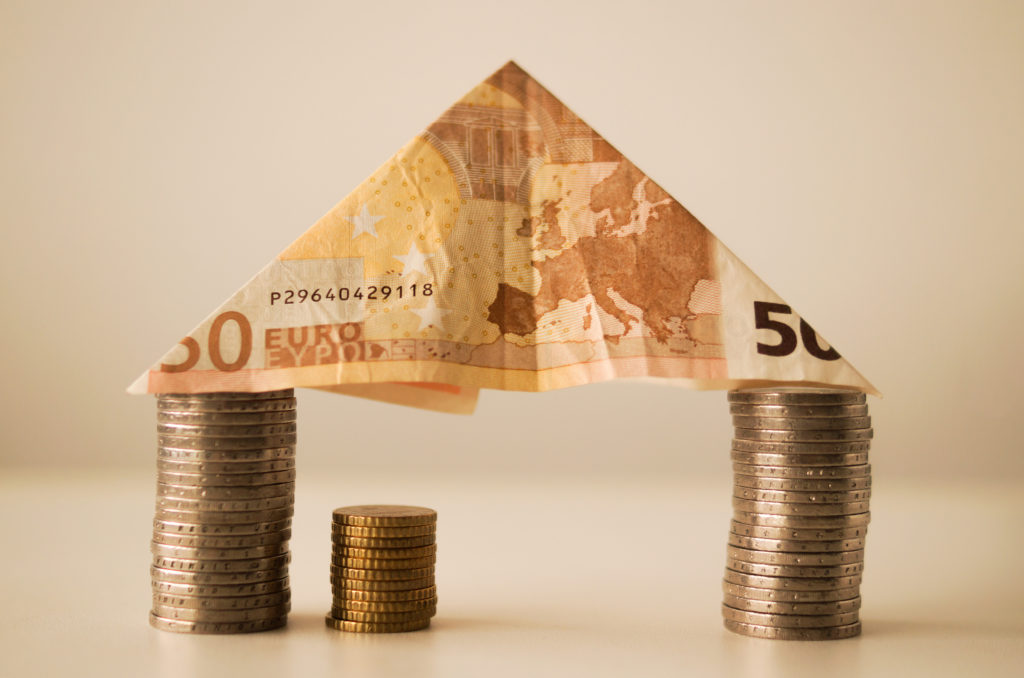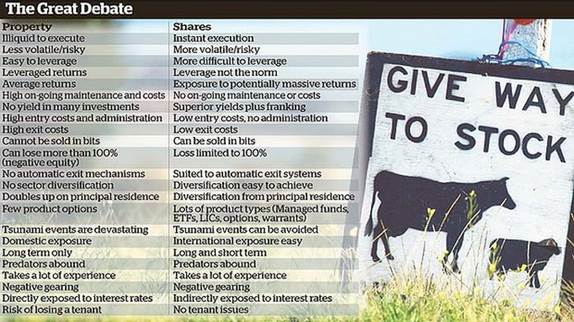
The difference between equities and property
I cannot tell you how many times I have read that you double your money in Australian property investment every ten years. It is the core assumption in all property marketing it seems.
Of course to make any money out of that implied 7% return per annum your rent has to cover your financing costs. The good news there is that with a tax break from negative gearing it just might. But the financing costs are not the whole equation. That 7% return also has to cover that expertly hidden finder’s fee, you know, the one that’s rolled into the price of your overpriced off the plan apartment without you realising. It also has to cover the real estate agent’s commissions, legal fees, stamp duty, the depreciation of any white goods and the cost of keeping everything just dandy. It also has to cover any renovations, managing agent fees, rates, the time you yourself spend mending the toilet, fixing the lights, replacing the roof tiles, unblocking the plumbing, replacing the boiler, let alone finding the property, selling the property, fighting tenants in court, dealing with body corporates and anything else that crops up, like stress and sleepless nights. Then of course there’s that unexpected $30,000 bill when your neighbour insists you fix the retaining wall before his property falls into yours.
All this is before inflation and inflation is not 3% as the government claims. Anyone who has ever paid a utility bill, bought food, filled the car or paid a private school fee knows that we all have our own personal inflation rates and it has nothing to do with a government calculation designed to dumb down the real inflation rate. For decades even the government inflation rate has averaged over 4% leaving you a 3% real return on property and that’s before you are taxed. Still think property is a ‘gimme’?
You can see why an equity investor finds the whole property thing a bit of a conundrum. When you buy BHP shares you don’t have to fix the loo, send them $45,000 to renovate or worry about that finders fee, the real estate commission, stamp duty and legals. You can buy it online for a competitive $19.99 commission and after that you don’t have to find a tenant, worry about interest rates going up or do anything at all in fact, but decide when to sell it (easier said than done).
Plus you can sell shares in bits. Try selling your house one bedroom at a time to pay the school fees, or buy a car or go on a holiday. Plus you can sell shares in an instant, online, in the bath, on a whim, from your mobile phone from a bar and unlike the property market you can liquidate multi-million dollar portfolios in minutes. Try doing that after you’ve bought “Twelve properties in twelve months” as some of that marketing would have you believe is normal. In shares you can also get exposure to large gains and extraordinary gains. When did a unit in Bendigo last go up 20% in a year or thousands of per cent in a lifetime. In the last year 38% of the ASX 100 was up over 20% and plenty of stocks have been up thousands of per cent.
So why is property so popular?
The basic advantage of property over shares is that it is a more reliable, less volatile asset. Because of that the culture is different, the culture says you can safely borrow a lot of money to invest in property and in so doing make money out of other people’s, out of the bank’s, money as well as your own.
The crux of property returns is not that you earn a paltry 7% but, if the rent covers all the borrowing costs, you get the whole 7% return as a return not on the value of the property but on the value of your deposit. In other words, on an 80% lending ratio, if you buy a property for $100,000 and make $7,000 a year, you are actually making $7,000 on your $20,000 deposit, which is not a 7% return but a 35% return. That’s why you invest in property instead of shares, because of the gearing. Its powerful stuff.
Of course you could do the same in shares, you could easily borrow 60 to 70% on the big stocks, but you’d be mad to do so because whereas property is ‘safe and steady’, shares are volatile and risky, at least that’s the perception.
Ultimately they are different asset classes with the emphasis on different. It is not one or the other it is whichever one suits you, whichever one you enjoy, whichever one you are best at. If you are good at equities, which are hard, stick to equities. If you know the property market stick to property. I have both. You probably do too and there’s nothing wrong with either. For a list of the main difference between the two see the table – this was written by me but published in the Age.

Property versus shares
As discussed above the core advantage of property over shares is that the banks will more readily lend into the property market and investors will more readily borrow. It’s accepted that you leverage into property. The borrowing rates are lower and you can get a higher LVR than you can with shares. That’s basically the difference. In other words the key advantage of property is that you can put up $100,000, borrow $900,000 and when the property market goes up 10%, you double your money. But when the stock market goes up 10% and you are not geared you make $10,000. In other words the main advantage of the property market over shares is that it more acceptably, and at lower interest rates, enhances the power of leverage.
The other great advantages of property over shares include:
- The fact that the Australian property market has gone up. It is a bit basic to say but it is an undeniable fact that the property market has provided Australians with steady gains for decades and they have become used to that. To the joy of property developers it has become an Australian assumption that ‘property always goes up’ and if it doesn’t, wait.
- Stability. Hindsight suggests that the property market is more stable with low volatility and only irregular isolated rather than systemic disasters. It can of course change but it hasn’t.
- Safety. The property market is perceived as safer than shares and the experience of the GFC absolutely confirms that. Whilst shares fell 54.5%, Australian property owners were basically, except for a few pockets, undisturbed. Property is perceived as a safer asset class than shares.
- Adding value. People can add value to property. They find it very hard to add value to shares.
- Collateral Benefits. Property delivers enormous non-financial benefits if you live in it. You can’t live in shares.
- Forced saving. People are driven to be disciplined by the gearing. They are forced to budget and save and be financially responsible when in debt. They pay down the debt and so build equity more reliably. This is not the culture in shares.
- Protected. The government and the banks do everything they can to ensure a stable property market which is core to confidence, economic stability and growth and key to the investment risk. On the other hand it is well accepted that there is little they can do to support the equity market so when it falls they simply let it go, it is not ‘government backed’. Property is. The whole nation’s interests are deeply rooted in the stability and success of the property market.
- Tax breaks. Negative gearing is a remarkable bonus that advantages the investor over the other tax payers. You can get it in shares as well of course but only if you borrow. Your principal residence in Australia is also capital gains tax free. This is a massive advantage for younger Australians relative to shares and anyone not taking advantage of that and buying shares or an investment property instead hasn’t done the numbers.
Basically leveraged property investment is a great investment if all the assumptions are right, if history continues to repeat itself, if property always goes up and if there is no ‘Tsunami event’ that re-prices the whole property market and allows my daughter to buy even half a standard block near her parents, which at current prices, she most certainly can’t. So what is the attraction of shares?
I’ll tell you.
- Risk is in the culture, it is understood, expected and it is managed. Most property investors are unprepared for risk, they have to assume a fall in price will never happen and God forbid if it ever does.
- Shares have liquidity, low entry costs, can be bought and sold in bits, you can take a big or small exposure and exit on a click.
- Their yields include franking.
- They can also offer exposure to massive returns rarely available in property.
- They can be short duration or long duration, not just long duration.
- Execution is instant.
- They are suited to automatic exit systems.
- There is no stamp duty.
- There are thousands of products to choose from.
- International investment is easy.
- Tsunami events can be avoided.
- You don’t have to fix the toilet if it goes wrong.
- No-one can burn your shares down.
- And if you’re old enough there’s no capital gains tax.
- The big one – no tax on your principal residence.
I like my principal residence, I won’t pay tax on that, I live in it and I can add value to it. But that’s enough. Borrowing more money to buy an investment property that makes no return unless the property market goes up is much more risky to me, there are too many assumptions and not enough liquidity. If my kids lived in it that might be different. It delivers value. But purely as an investment? I’ll stick to shares, I don’t have to have ‘faith’ in the market and I don’t have to borrow. It’s also what I do and we should all stick to what we do best.
